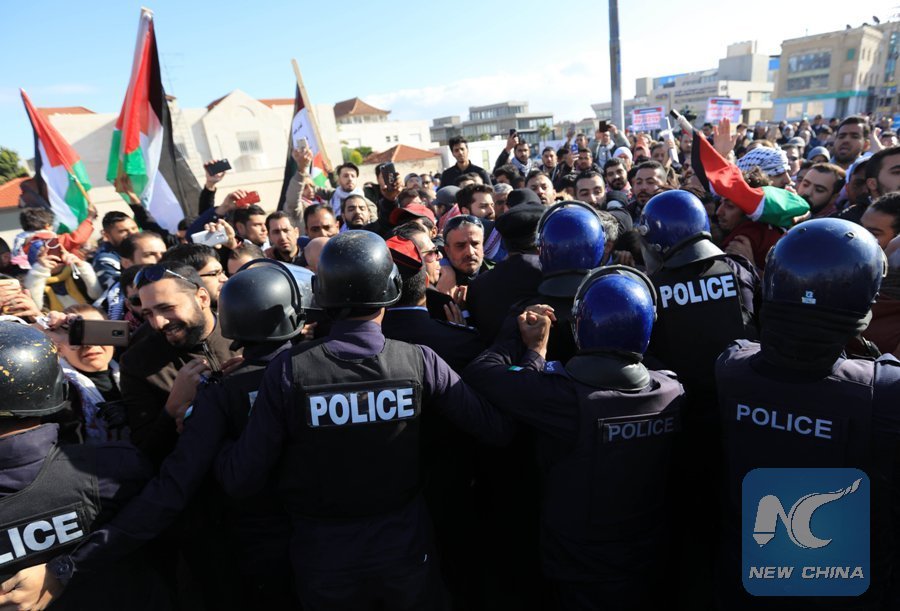
People attend a protest against the U.S. decision to recognize Jerusalem as Israel's capital, in Cairo, Egypt, on Dec. 7, 2017. (Xinhua/Ahmed Gomaa)
WASHINGTON, Jan. 18 (Xinhua) -- U.S. Vice President Mike Pence will start a trip on Friday to the Middle East including stops in Egypt, Jordan and Israel. The upcoming tour is likely to be bumpy and will do little to mollify the rising rage in the region over America's Palestinian policy, said experts.
POSTPONED TRIP
The White House said Monday that the five-day trip will enable Pence to meet with Egyptian President Abdel Fattah al-Sisi, King Abdullah II of Jordan and Israeli Prime Minister Benjamin Netanyahu, concentrating on key topics like combating terrorism and improving U.S. national security.
The visit was postponed last month after President Donald Trump recognized Jerusalem as Israel's capital and announced that the U.S. embassy would move there. There is still roaring anger across the region over Trump's announcement.
During his tour, Pence will not visit the West Bank or meet with Palestinian President Mahmoud Abbas, who ordered Trump's decision be brought to the UN Security Council for a vote last year, and canceled the meeting with Pence in protest over Trump's Palestine policy.

Protesters shout slogans near the U.S. Embassy in Amman, Jordan, on Dec. 7, 2017. People took part in demonstrations in Jordan to protest against U.S. President Donald Trump's decision to recognize Jerusalem as the capital of Israel and move the U.S. Embassy from Tel Aviv to Jerusalem. (Xinhua/Mohammad Abu Ghosh)
Earlier, the Israeli parliament approved the "unified Jerusalem" bill aiming to separate Palestinian neighborhoods from Jerusalem.
The new legislation stipulates that any of the government's decision to hand over parts of Jerusalem to the Palestinian authority in the future needs the approval of 80 out of 120 parliament members. It is widely seen as a further blow to the Jerusalem status talks.
The Arab world is also furious over the recent U.S. decision to withhold aid for Palestinian refugees worth 65 million U.S. dollars.
Washington also threatened in November not to renew the certification of the Palestinian Liberation Organization (PLO) office in Washington for it to continue operations.
U.S. ROLE IN PEACE INITIATIVE DOWNSLIDING
As the Arab nations vowed to continue their support for an independent Palestine with east Jerusalem as its capital, the world is expected to see the U.S. mediating role in the region weaken as a consequence of its controversial Jerusalem decision.

Palestinian protesters run to take cover from tear gas fired by Israeli troops during clashes after a protest against U.S. President Donald Trump's decision to recognize Jerusalem as the capital of Israel, in the West Bank city of Bethlehem on Dec. 8, 2017.(Xinhua/Mamoun Wazwaz)
Dan Mahaffee, senior vice president and director of policy at the U.S. Center for the Study of the Presidency and Congress, told Xinhua that Pence's Middle East trip was derailed by the U.S. Jerusalem announcement.
"There is no way that the Palestinian leadership can accept the embassy move, even if it does mean a cutoff in U.S. support," he added.

A protester shouts slogans near the U.S. Embassy in Amman, Jordan, on Dec. 7, 2017. People took part in demonstrations in Jordan to protest against U.S. President Donald Trump's decision to recognize Jerusalemas the capital of Israel and move the U.S. Embassy from Tel Aviv to Jerusalem. (Xinhua/Mohammad Abu Ghosh)
Darrell West, a senior fellow at the Washington-based think tank Brookings Institution, noted that "Palestinians feel the U.S. is one-sided in its Mideast policies and not being fair-minded."
If Trump is determined to push forward his Middle East plans in disregard of Arab aspirations, there is little prospect for a peace deal between the Palestinians and Israel, warned the analysts.

